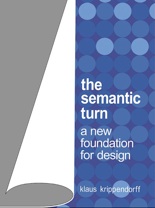notions about language


speech acts
“... we draw on speech act theory, as originated by the philosopher J. L. Austin (How to Do Things with Words, 1962). Austin studied a class of utterances (which he termed 'performatives') that do not refer to states of the world, but that in themselves constitute acts such as promising, threatening, and naming. He argued that the generally accepted view of the truth and falsity of propositions was not applicable to many of these speech acts. It does not make sense to ask whether a particular utterance of "I pronounce you man and wife" or "Get me a hamburger" is true or false, but rather whether it is felicitous --whether it is appropriate to the context in which it is uttered.
Austin's student Searle (Speech Acts, 1969) formalized the structure of the felicity conditions associated with a variety of speech acts, such as promising and requesting. In "A taxonomy of illocutionary acts" (1975) he classified all speech acts as embodying one of five fundamental illocutionary points. These categories cover all utterances, not just sentences with explicit performative verbs such as "I promise. . . " and "I declare. . . " For example, we can talk about a speech act as being a promise even though, its form may be a simple statement, as in "I'll be there."
The five categories of illocutionary point are:
Assertives: commit the speaker (in varying degrees) to something's being the case-to the truth of the expressed proposition.
Directives: attempt (in varying degrees) to get the hearer to do something. These include both questions (which can direct the hearer to make an assertive speech act in response) and commands (which attempt to get the hearer to carry out some linguistic or non-linguistic act).
Commissives: commit the speaker (again in varying degrees) to some future course of action.
Expressives: express a psychological state about a state of affairs. This class includes acts such as apologizing and praising.
Declarations: bring about the correspondence between the propositional content of the speech act and reality, as illustrated by the example of pronouncing a couple married.
Searle distinguishes among the illocutionary point of an utterance, its illocutionary force, and its propositional content. The illocutionary point is one of the five categories above. Two speech acts (such as a polite question and a demand for information) may differ in their illocutionary force (manner and degree) while having the same illocutionary point (in this case a directive), The fact that an utterance involves a proposition about some topic, such as the speaker's attendance at a particular meeting at a particular time, is its propositional content.
The essential importance of illocutionary point is the specification of meaning in terms of patterns of commitment entered into by speaker and hearer by virtue of taking part in the conversation. The taxonomy classifies the possibilities for what a speaker can do with an utterance. It is not a set of cultural conventions like those governing polite behavior. It is based on the underlying set of possibilities for how words can be related to the world. Each culture or language may have its unique ways of expressing the different speech acts, but the space of possibilities is the universal basis of our existence in language.
Winograd, T. and F. Flores 1987 Understanding Computers and Cognition p. 58
Languaging as a manner of daily living ... can in fact take place in many different manners. In us, languaging takes place mostly through speech, so it must have involved sound production by mouth in correlation with coordinations of behavior from very early in this history. Let us recall that a lineage begins in the recursive reproductive conservation of a manner of living; let us also recall that the reproductive conservation of a manner of living is systemic and not genetically determined, even though it entails the systemic conservation of the genetic constitution of the initial organic structure that makes possible the epigenetic realization of the manner of living conserved.
Origin of Humanness in the Biology of Love, page. 62
we live embedded in language
Like a fish in water, it is difficult for us to really see what we are totally immersed in. Yes, we can study it, but most of what we think about language is in the domain of linguistics; i.e. the structure, use, and classification of languages.
The general perception of language is a that it is a system of symbols used for communication. However, the idea of a symbol is already an idea in language. We need to look deeper.
In the following pages, I will present my understanding of the generative process that has led us to be thus immersed in language, as a way of being with others. The Spanish distinction, “idiom” as the various languages we speak (English, French, Chinese, etc.) and “lingua” as the generic notion of language as a process.
coding and decoding
The general notion that people often accept, namely that somebody “codes” their idea as sound, gesture, or text, which gets sent out, transmitted across the gap between that person and an other either visually, or acoustically, and then is received and decoded by the other... is grounded in the use of codes that have been developed to represent what was already in place. Morse code is a great example of this.
The notion of coding/decoding was further made relevant as we began to transmit information electronically, and indeed that is where the technical definition of “information” derives from.


There are of course many different ways that people have come to claim what language is, or does, or how it comes about. krippendorff has offered a categorization, published in his book “the semantic turn” (explicitly not capitalized, he claims capitals are unnecessary, as a period already tells us we’re at the end of a sentence, and he sees no need to capitalize names.)
The download available here is by permission of the author.
accounts
klaus krippendorff has worked in Design, Communication, and Language and is currently a Professor Emeritus at the Annenberg School for Communication (U. Penn). I have had the privilege of listening to him speak, and even co-delivering a workshop on language and conversation.
klaus emphasizes that language is social, it always takes place as a coordinating process with others, and thus speaking always entails ethical choices. One of the ways he expands on this is through the notion that as we assume responsibility, we become an agent. Much of what we speak can be looked at as “accounts” of various types, eg:
-
1) explaining, as an invitation to coordinate understanding
-
2) excusing, as a plausible argument to claim that you were not an agent. Thus excuses are optional, they don’t change what is happening, but they do alter the relationships.
-
3)justifications; an attempt to get everyone on board, to reveal the virtues of some approach; in other words a kind of creative ethics.
He also notes that authority can be assigned or declared - but there is much more to explore in his writings, as he has several books!
sign is language
...to be born deaf is infinitely more serious than to be born blind – at least potentially so. For the prelingually deaf, unable to hear their parents, risk being severely retarded if not permanently defective, in their grasp of language unless early and effective measures are taken. And to be defective in language, for a human being, is one of the most desperate of calamities, for it is only through language that we enter fully into our human estate and culture, communicate freely with our fellows, acquire and share information. If we cannot do this, we will be bizarrely disabled an cut off – whatever our desires or endeavours, or native capacities. And indeed we may be so little able to realize our intellectual capacities as to appear mentally defective.
It was for this reason that the congenitally deaf, or “deaf and dumb” were considered “dumb” (stupid) for thousands of years and were regarded by an unenlightened law as “incompetent” – to inherit property, to marry, to receive education, to have adequately challenging work – and were denied fundamental human rights. This situation did not begin to be remedied until the middle of the eighteenth century, when (perhaps as part of a more general enlightenment, perhaps as a specific act of empathy and genius) the perception and situation of the deaf were radically altered.
Oliver Sacks, Seeing Voices p. 9
The deplorable state of the deaf aroused both the curiosity and the compassion of the philosophers.
Thus the Abbé Sicard asked:
-
Why is the uneducated deaf person isolated in nature and unable to communicate with other men?
Why is he reduced to this state of imbecility? Does his biological constitution differ from ours?
Does he not have everything he needs for having sensations, acquiring ideas, and combining them
to everything we do? Does he not get sensory impressions from objects as we do?
Are these not, as with us, the occasion of the mind’s sensations and its acquired ideas?
Why then does the deaf person remain stupid while we become intelligent?
To ask this question – never really or clearly asked before – is to grasp its answer, so see that the answer lies in the use of symbols. It is, Sicard continues, because the deaf person has “no symbols for fixing and combining ideas… that there is a total communication-gap between him and other people”. But what was all-important, and had been a source of fundamental confusion since Aristotle’s pronouncements on the matter, was the enduring misconception that symbols had to be speech … Socrates’ remark in the Cratylus of Plato, which so impressed the youthful Abbé de l’Epée:
-
If we had neither voice nor tongue, and yet wished to manifest things to one another,
should we not, like those which are at present mute, endeavor to signify our meaning
by the hands, head, and other parts of the body?”
Oliver Sacks, Seeing Voices p. 14

speaking
approaches to distinguishing language

